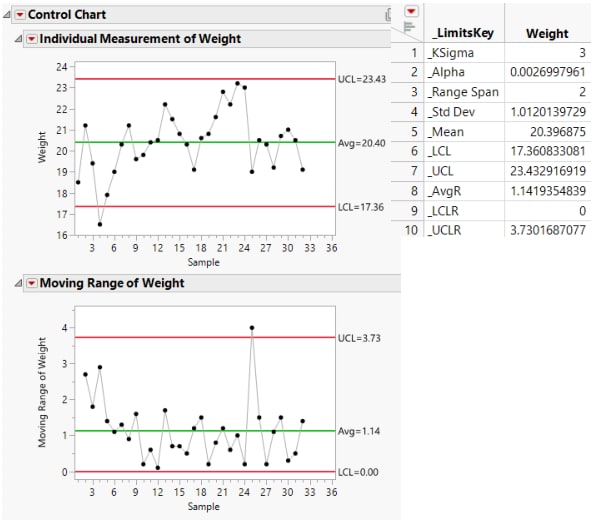Saving and Retrieving Limits
You can use the following previously established control limits for legacy control charts:
• upper and lower control limits and a center line value
• parameters for computing limits, such as a mean and standard deviation
The control limits or limit parameter values must be either in a JMP data table, referred to as the Limits Table, or stored as a column property in the process column. When you specify the Control Chart command, you can retrieve the Limits Table with the Get Limits button on the Control Chart launch window.
Tip: To add specification limits to several columns at once, see Manage Limits.
The easiest way to create a Limits Table is to save results computed by the Control Chart platform. The Save Limits command in the red triangle menu for each control chart automatically saves limits from the sample values. The type of data saved in the table varies according to the type of control chart in the analysis window. You can also use values from any source and create your own Limits Table.
All Limits Tables must have:
• A column of special keywords that identify each row.
• A column for each of the variables whose values are the known standard parameters or limits. This column name must be the same as the corresponding process variable name in the data table to be analyzed by the Control Chart platform.
The following table describes the limit keywords and their associated control chart for both legacy control charts and charts created with Control Chart Builder.
|
Keywords |
For Charts |
Meaning |
|---|---|---|
|
_KSigma |
All except Control Chart Builder and V-Mask CUSUM |
multiples of the standard deviation of the statistics to calculate the control limits; set to missing if the limits are in terms of the alpha level |
|
_Alpha |
All except Control Chart Builder |
Type I error probability used to calculate the control limits |
|
_Range Span |
IM, MR, MMR |
number of consecutive measurements for which moving ranges are computed. Not applicable in the Control Chart Builder platform, where the range span is always equal to 2. |
|
_Sample Size |
All except Levey-Jennings and Presummarize |
subgroup size |
|
_Std Dev |
XBar, R, S, IM, MR, G, T, V-Mask CUSUM, and Levey-Jennings |
known process standard deviation |
|
_U |
C, U |
known average number of nonconformities per unit |
|
_P |
NP, P |
known value of average proportion nonconforming |
|
_LCL, _UCL |
XBar, IM, P, NP, C, U, G, T, and Levey-Jennings |
lower and upper control limit for Mean Chart, Individual Measurement chart, or any attribute or rare event chart |
|
_AvgR |
R, MR |
average range or average moving range |
|
_LCLR, _UCLR |
R, MR |
lower control limit for R or MR chart upper control limit for R or MR chart |
|
_AvgS, _LCLS, _UCLS |
S Chart |
average standard deviation, upper and lower control limits for S chart |
|
_AvgR_PreMeans _AvgR_PreStdDev _LCLR_PreMeans _LCLR_PreStdDev _UCLR_PreMeans _UCLR_PreStdDev _Avg_PreMeans _Avg_PreStdDev _LCL_PreMeans _LCL_PreStdDev _UCL_PreMeans _UCL_PreStdDev |
IM, MR |
Mean, upper, and lower control limits based on pre-summarized group means or standard deviations. |
|
_Data Units _Two Sided _Headstart _Beta _Delta |
V-Mask CUSUM |
specifications for V-Mask CUSUM chart |
You can save limits in a new data table or as properties of the response column. When you save control limits using the in New Table command, the limit keywords written to the table depend on the current chart types displayed.
Figure 14.16 shows examples of control limits saved to a data table using Coating.jmp. The rows with values _Mean, _LCL, and _UCL are for the Individual Measurement chart. The values with the R suffix (_AvgR, _LCLR, and _UCLR) are for the Moving Range chart. If you create these charts again using this Limits Table, the Control Chart platform identifies the appropriate limits from keywords in the _LimitsKey column.
Figure 14.16 Example of Saving Limits in a Data Table
Note that values for _KSigma, _Alpha, and _Range Span can be specified in the Control Chart Launch window. JMP always looks at the values from the window first. Values specified in the window take precedence over those in an active Limits Table.
Rows with unknown keywords and rows marked with the excluded row state are ignored. Except for _Range Span, _KSigma, _Alpha, and _Sample Size, any needed values not specified are estimated from the data.
